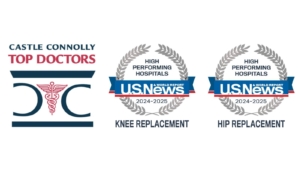When is it time to have my knee or hip replaced?
Deciding to finally “give in” and undergo hip or knee replacement for almost everyone is scary and usually occurs only after they’ve tried a lot of other strategies to delay. This is an absolutely appropriate response, “to feel scared” and an appropriate strategy, exhaust conservative treatments.
At some point these conservative strategies (like NSAIDs or Tylenol, modifying activities, exercise or therapy, weight loss, modalities like ice or heat, chiropractic treatments or massage and much more) no longer are “effective enough” and deciding to have a hip or knee replacement becomes appropriate. This point is seldom black or white. Each individual has their own needs and tolerances. Even pain, while very real is perceived very differently by different people. Sometimes it’s not pain or even discomfort that ultimately pushes someone “over the edge” but a feeling of frustration or even embarrassment. Frustration that they can no longer play tennis or golf with their buddies. Embarrassment when they struggle to stand after a business lunch or getting off an airplane and having to walk through the terminal. For many, it is when they begin to feel that they are losing their independence and even fear injury or a fall. For others, it’s no longer being able to get a good night sleep or enjoy sexual relations.
This week a patient told me he was losing his “edge” or his “mojo”. We both smiled. I understood that. I often hear patients tell me “they’re losing their quality of life”. I respect this. Life if precious. Each day needs to be appreciated.
The trend that I’m seeing is that younger and younger patients are now demanding hip or knee replacement sooner. No longer is it reality that these artificial joints “last only 10 years” and can’t be re-done if they fail. On the other end of the spectrum, I’m seeing more and more really senior individuals (late 80’s and 90’s) who “aren’t ready to hang it up” and want a replacement. For them it’s maintaining independence, mobility, and getting out of pain. I respect this too.
Whatever the specific reason or trigger, my personal feeling is that if they have a hip or knee condition that is not treatable with conservative methods or which can no longer be minimized or placated with non-operative treatments but can be treated predictably and effectively with a hip or knee replacement and they’re miserable, then I support and encourage their decision to proceed. For both the very young and the very old.
If you are feeling disabled from an arthritic hip or knee condition, my recommendation is to educate yourself. Learn about your condition. Understand how your condition will probably progress or not. Earnestly apply non-operative treatments until you’re convinced they not providing the relief you seek or allowing you to remain as active as you want to be. At some personal point in your journey, seek the advice of an orthopedic surgeon who has special skill and interest in hip or knee replacements and discuss your situation. Ultimately, deciding to proceed with hip or knee replacement will be a decision you make, but you need to make it with information and the counseling of someone you trust.
Dr. William A. Leone is head of the Leone Center for Orthopedic Care at Holy Cross Hospital in Fort Lauderdale, Florida and has earned a reputation as one of the nation’s top orthopedic surgeons. An orthopedic surgeon with extensive experience, his specialty is solving complex hip and knee problems.
We thank you for your readership. If you would like a personal consultation, please contact our office at 954-489-4584 or by email at LeoneCenter@Holy-cross.com.





